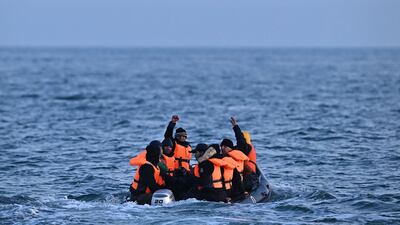When I need to get to London’s Heathrow Airport at an awkward hour, I call a taxi company owner who is a migrant success story. He is from Iraqi Kurdistan and now runs several small businesses. If he is free, he drives me himself.
We have had long conversations about migration. He left Kurdistan as a teenager and began a very, very long walk through Turkey. He arrived in Britain with nothing. Nowadays he enriches our country through his hard work.
Our conversations come to mind when I hear about various government initiatives to “control” migration – initiatives that sometimes sound as likely to be successful as planning to “control” the weather. US President Donald Trump, for instance, promised to “build a wall and make Mexico pay for it”.
Former German chancellor Angela Merkel once said “Wir schaffen das” – meaning “we can do it” – when there was an enormous influx of migrants. One result was the rise of resentment and the German far right. Belgium, the Netherlands, France, Italy and now the UK have also seen the rise of far-right political parties energised by migration as the hottest issue to enrage voters.
In the UK, Nigel Farage’s latest political vehicle, the Reform UK party, did well in recent local elections although – an important caveat – most English voters can’t be bothered to turn out for local council elections. The results, therefore, tend to be skewed towards those who are energised to vote, and immigration is a great energiser.
In various democracies, so many governments have tied themselves in knots over promises to limit immigration, stop the boats, build the walls, and so on – but often without much success. Like my Kurdish friend, many migrants simply have no choice but to leave their homeland and somehow get round the migration barriers.
Mr Trump’s second term has begun with forcible arrests and deportations of supposedly “illegal” migrants, promising a hostile environment for newcomers. In Britain, Prime Minister Keir Starmer announced a new “get tough” policy. Opinion polls suggest it has gone down well with half the electorate while others are angry at echoes of the country’s troubled past on immigration control.

In 1968, the MP Enoch Powell – a man with ambitions to become prime minister – told a Conservative party audience that immigration of workers mostly from the Caribbean and South Asia meant that “I am filled with foreboding; like the Roman, I seem to see the River Tiber foaming with much blood”. This classical reference to the Roman poet Virgil and the inflammatory prospect of some kind of race war effectively ended Powell’s ambitions.
Mr Starmer this month offered his own prophecy on migration, namely that without controls, “we risk becoming an island of strangers – not a nation that walks forward together”. We shall see how effective these new controls are over the next few years. But British people remain sceptical, especially after 14 years of failed migration policies and promises of the erstwhile Conservative government.
As home secretary, Theresa May promised “a really hostile environment for illegal immigrants”. Migration went up. Then-prime minister David Cameron promised net migration falling to fewer than 100,000 a year. It peaked at about 900,000. Britain also left the EU. That meant fewer EU migrants, but gaps in the workforce for often low-paid jobs were then filled by other migrants, many of them from India, Pakistan and Africa.
When I recently asked a migration expert to define the “problem” of migration, the response was clear. It wasn’t that Britain is a racist country. It wasn’t even the numbers. For most British people, I was told, the most visible flashpoint issue is the small number of boats run by criminal gangs bringing migrants across the channel from France. This is understandable. British people are right to be outraged by pictures on television that show that the UK does not seem to be in control of its own borders.

Those pictures also provide a great photo-opportunity for the likes of Mr Farage and his anti-migrant campaigning. He is often photographed on the English coast near Dover complaining that the government has “lost control”, even if the small boats are a tiny part of the migration figures. The highest number of migrants crossing the channel in small boats was 45,774 in 2022. Of course criminal gangs trafficking in human misery have to be stopped, but net (legal) migration in 2023 was, as mentioned, 20 times greater, at 900,000.
The Starmer plan will try to make migration to the UK more difficult. It will attempt to get a grip. But it will also leave gaps in low-paid jobs often done by migrants, including social care, in nursing homes and in the health service. Another island nation, Japan, tightly controls immigration but the falling birth rate and ageing population mean that one in 10 Japanese citizens is over the age of 80.
So which problem do British policymakers want to solve? Is it the number of newcomers? Is it arresting boat traffickers and other criminals? And above all, will tight immigration controls also mean keeping out hard-working young people who – like my Kurdish friend – enrich the UK through their skills and determination?
Real solutions are difficult, while political promises glide off the tongue.



